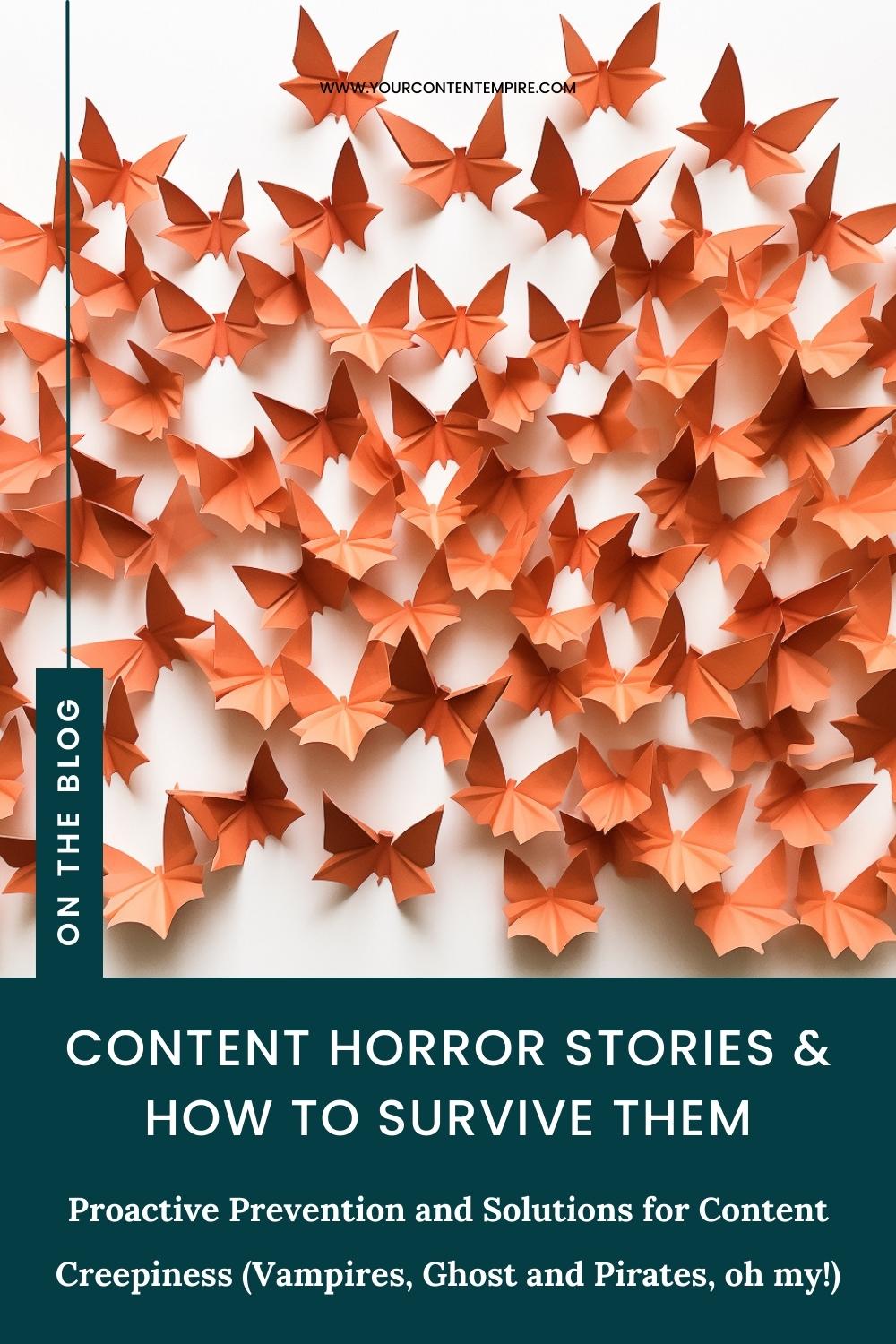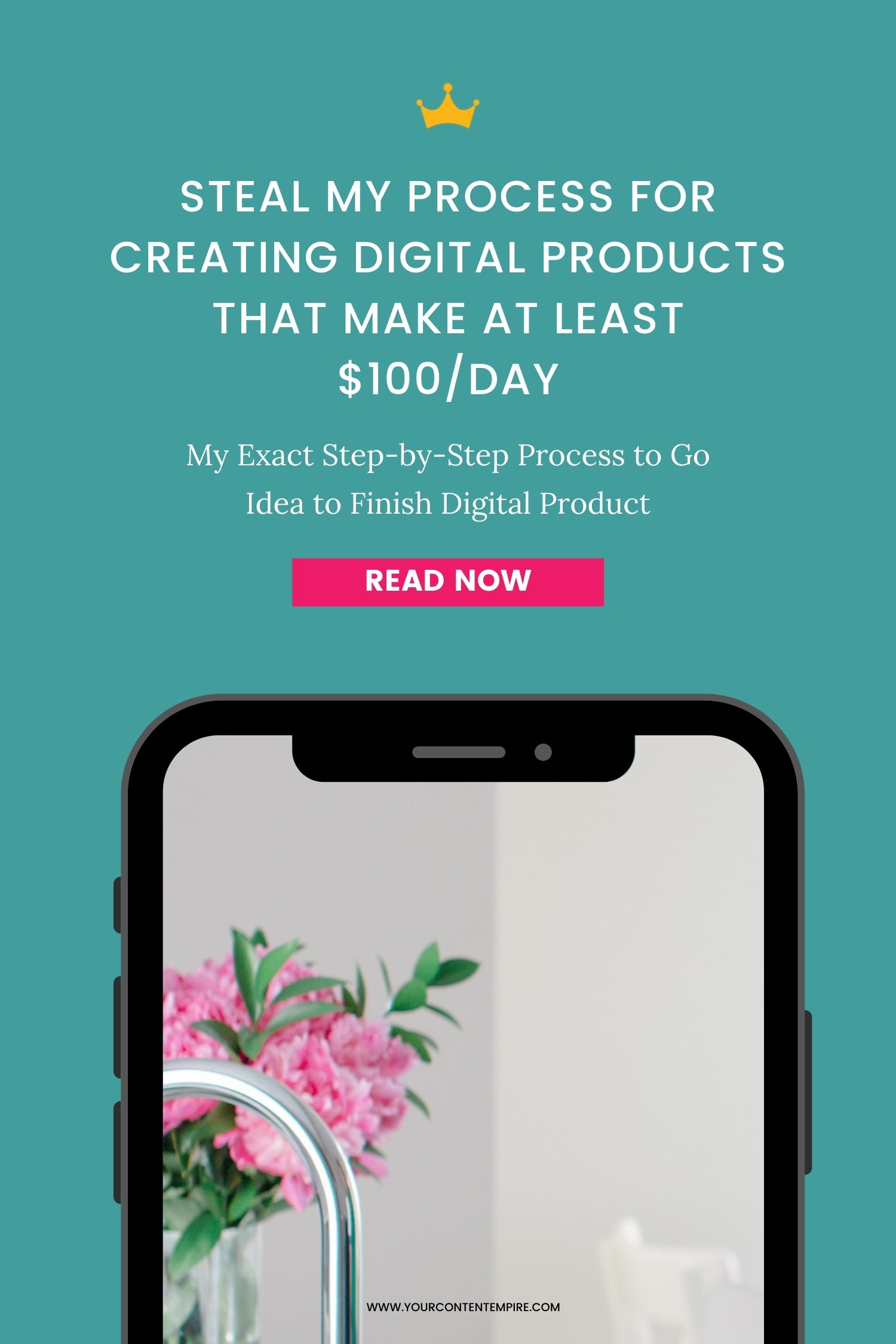Spooked by Content Nightmares? Ever had a content mishap that sent shivers down your spine?
This week, we're diving into the eerie side of content creation. From vanishing funnel folks to unexpected “vampire” visitors, we've got stories that'll make your hair stand on end.
Here’s a sneak peek:
☠️ Pirates & Plagiarism: Ever poured your heart into creating a course or program, only to find out it's been swiped and resold? Join me as I unpack my own tale of betrayal – from spidey senses tingling over a shady credit card purchase, to the shocking moment someone spilled the beans.
Ghosted by the Funnel Phantom: Ever dished out big bucks for a promised service, only to have the expert vanish into thin air? Dive into this eerie tale where big promises turn into chilling silences.
The Overstepping “Vampire”: Ever felt the chills from a connection that went too deep, too fast? Tune in for this blood-curdling tale of a 2019 public speaking challenge where heartwarming connections turned into an uninvited knock on the door. (Yup, seriously.)
Check Out the 2024 Content Empire Planner to Help Plan for 2024:
FULL TRANSCRIPT (CONTENT HORROR STORIES):
Welcome back to the Content Coffee Break podcast. I am here for a spooky episode about our content horror stories and how to prevent them in honor of Halloween. Today is Halloween, and that is my second favorite holiday. It used to be my first, but I've gotten really into Christmas. However, one of the things that I love about the bridge between Halloween and Christmas is this time of year. It also leads into my birthday and my husband's birthday, so it's just a really festive time. All the fun things are happening in the next three to four months.
One of the decisions we made when we bought a house was to lean into “Nightmare Before Christmas” as our Christmas decoration theme for the exterior of the house. It's the perfect bridge theme between Halloween and Christmas. We can put up our decorations maybe a week before Halloween and keep them up all the way through Christmas. How efficient! I love it. This is also a bridge between Halloween and your content, because there are a lot of spooky, scary things that happen in content. I've had a lot of fun and, as you'll hear, some kind of scary conversations in the DMs this week about situations and stories related to content. Understandably, most people wanted to keep things anonymous.
So, like the content genie, their wishes are my command, and I'm switching up my original plans for this episode. Come around my campfire and let's tell some spooky content tales.
Our first content horror story has to do with pirates and thieves, namely plagiarism. I've heard about different pirate situations in the past couple of weeks. These pirates are really up to no good. Some incidents involved entire websites being stolen or individual web pages where it's evident that they were heavily inspired by the copy on another website. It makes you think, “Am I having deja vu here?” Other issues have been about social media profiles being stolen.
That's happening more frequently. I should've included catfish in the pirates and thieves mix. This could involve just your picture being stolen or even your name and picture with someone trying to impersonate you. I heard about someone whose Instagram profile was stolen, and then the thief filed a complaint against the original owner, accusing them of being the fake. They resolved it in the end, but it was quite a mess for a while. Other situations involve content being plagiarized or heavily repurposed.
One story I want to focus on is about entire courses being stolen. There are two main ways I've heard of this happening. The first is by previous students taking the course, then creating something extremely similar and trying to pass it off as their own. The sense of betrayal in such situations must be immense. Another method is through fraud. I received a notification once that someone had enrolled in my signature course using a fraudulent credit card. Three days later, I was informed that my course was being resold on a website.
Seeing my course there and many others by industry peers was unsettling. My initial response was to contact others whose courses I saw listed, hoping for a solution. The overwhelming response was that there's not much you can do. Some suggested sending a DMCA takedown notice, but with little hope of success. I took a different approach by purchasing my course from the reseller. Using PayPal, I then filed a complaint stating that the course was fraudulent. This prompted a response from the reseller, who then removed my course.
In the future, I might not go through the stress and worry of that process. However, there was a sense of satisfaction in getting my course removed, even if just for a while.
One of the things I want to talk about here is pirate-proof prevention. So, you could go ahead and do what I did, but in preventing these kinds of situations, I think it's very important to have your copyright and your terms and conditions all buttoned up. There are a lot of templates for legal notices and website notices that you can take and use and customize. However, I would take it one step further and actually get a local lawyer, someone who is in your state or in your province or in your area, to review those and just make sure that it makes sense for where you are located. This is by no means legal advice. This is just what I did.
The other thing to do is update your course and your programs regularly. Even though this course went up, I was in the middle of revamping my course, and I have revamped my signature course about six times in just over that number of years. So, almost every other year or every year and a half. I've worked with different instructional designers. I just want to make this the best course ever with the best resources in there and the best experience. I'm super invested in making that happen. I'm very inspired by Denise Duffield-Thomas, who has revamped her course so many times. Every single time it gets better. And I'm like, that is the type of investment that I want in the courses for my students. So, I took a page out of her book. Have your copyright terms and conditions updated and update your course regularly. Even though this course was stolen, it was outdated by even three or four months later. So if it's out there, it's a very outdated version of it.
The other thing is, I think it's important to have some kind of onboarding process when you sell your course. That way, you can send an onboarding form, you can send a personal outreach email, but you get the sense that there's a person behind there, and they get the sense that there's a person behind there too, who cares about their course, cares about your experience in that course, and wants to know who you are, what your business is, or what your goals and challenges are. This personal connection can go a long way in preventing this type of situation. They would be a real jerk to turn around and steal your course after that.
When it comes to solutions if you find yourself in that situation, the first thing is to send a DMCA takedown notice. It's a legal letter that lets them know you're aware of it and to take it down. Of course, the response will depend on the situation. Was it a former student? Or was it someone anonymous trying to sell your course at a fraction of the price or pass it off as their own? The DMCA takedown notice is a good course of action. However, if it's someone you know, like a former student, definitely try to talk to them first. Some people, when confronted, will deny it even if it's obvious. I think your next course of action, even if it's extreme, is to name and shame. But be cautious. Make sure you've talked to them first. I've been in situations where I knew someone's course was stolen and repackaged as their own. They named and shamed them, and because of that, I knew that this person was also in my course. I was then able to remove them from the program. It's essential for others to be aware of such individuals, as long as it doesn't turn into online bullying. Accountability is crucial. Another extreme option is to buy the pirated content and complain. At the end of the day, I want you to know that if your content gets stolen, it's not your fault. And don't let it stop you from sharing generously. This isn't an everyday occurrence. Most people are good, and if you share more, you have more people looking out for you. I've had multiple people inform me when they've seen someone use my content without credit. Don't let this fear stop you from sharing.
As we move to the next topic, I guess this is where I say, “Are you afraid of the dark?” But our next story is about ghosts. I've heard of situations where people hire someone for content, and then that person disappears or steals. This has happened with content VAs and, quite frequently, with web designers.
Unfortunately, because I run a funnel agency, I've had people come to me having been burned by other funnel builders and funnel agencies. I've seen this one, like two or three times. In the clients that I've worked with, or clients that I've talked to, they've just been too scared to move forward, which is understandable. In this situation, a person came to us to work with us on their funnel. It was one of my favorite projects, but they had been through a horrible experience of forking over thousands of dollars upfront. Then, that funnel agency completely pulled a vanishing act; they couldn't get ahold of them or anything. The client was really burned and unsure. During the call, I told them to only move forward if they were comfortable, to sleep on it many days, and to do all the research and due diligence they needed to do. Luckily, it worked out right. We launched their funnel in a record eight weeks, and even three years later, that funnel is still bringing in sales for them. We've stayed in touch regularly to check in on how things are going, to offer insights for tweaks that they can make, and they get to focus on the platform they love because they know it's tied to an automated sales system that handles the selling for them. So, whether they're showing up on Instagram or TikTok, there's a path that takes care of the selling for those who come into their orbit and audience. Unfortunately, in their case, the person they had worked with kept them hanging, saying things like, “Oh yeah, we're getting to it,” or “We had a delay.” By the time they realized this person wasn't going to respond anymore, it was too late for them to get their money back. The six-month period on PayPal had expired.
The big thing here around ghost-proof prevention and how to avoid getting into this situation yourself is to always do your due diligence. It's important to pick people who have strong ties to the online community, meaning you recognize some of the people they're using as case studies or testimonials. Do your due diligence by reaching out to those people and checking if it's legitimate. What was their experience? Would they recommend it? Some things to really watch out for include saying yes to everything and over-promising. If they're doing that, they're telling you exactly what you want to hear. They should be honest about their process. If they want all the money upfront, that's a warning sign. In our agency, we do milestone-based payments. Some money is due upfront, but not all of it, and it's due after we have delivered on things. A note on guaranteeing results: anything online, including personal coaching and services, can't guarantee results. It's a red flag if people do. Although the majority of the funnels we create do very well and perform higher than industry standards, it's not a guarantee. Some people change their minds, or they're not committed to the process. We can build the best funnel, but if you're not committed to promoting it, it won't work. If you're not willing to spend money on Facebook ads and do the content promotion, the funnel will languish. So, if people promise results without knowing all these factors, that's a big, big red flag. However, you can rely on track records, and with due diligence, check in with references to ensure legitimacy.
Another thing is to make sure you sign a contract. This contract should outline responsibilities, potential timelines, and procedures for unforeseen circumstances. Now, let's talk about ghost-busting solutions. If you find yourself in this situation, the first step is to communicate: send emails and follow up. If you're not hearing back or not hearing back timely, have a three-strike policy. Things happen, and people get busy. However, repeated delays are a problem. Keep a record of those conversations. A note about autoresponders: most businesses we work with are small, so they usually have a 2-5 day business turnaround. This should be mentioned in their autoresponders and, ideally, in the contract. Be aware of communication turnaround times and be patient within that timeframe. If someone isn't responding, try reaching out everywhere: social media, email, website forms. Keep a record of your outreach. If there's still no response after a considerable period, set a response deadline. If they still don't respond, assume they are acting in bad faith. Finally, protect your payments. If you're sure they won't follow through, use your PayPal or credit card protection.
Yes, you're going to need to show evidence, which is why I told you to keep records of everything. But that is there for a reason. Your protections are there for a reason. The next thing is to get lawyers involved, right? Depending on how much money it is, is it going to be an expensive lesson or is it going to be something that's worthwhile following up on at the end of the day? What I want you to do is definitely be cautious and intentional with investing. Do your homework, but also don't let fear keep you from making the moves that you know are going to move your business forward. You don't want to act from a place of fear. You want to be able to move from a place of intention and confidence, just knowing that you've dotted your I's and crossed your T's and things are in order.
Our final content horror story, and this one is spooky, is around vampires. Some different bloodsucking situations would be stuff like someone in a group program who sucks all the air out of the room or on coaching calls who monopolizes the conversation. As a facilitator, it becomes hard with that person in the room to move things along as much as your intentions are to do that. The other situation I've seen this come up in some of the conversations I've had is around trauma dumping. So people responding back to your emails with some really heavy stuff, right? So some trauma dumping that is traumatic to you. You need permission to share those things. The other thing is weird pitches with no personalization from people who should know better. I hate that. I don't even respond. We have a caveat in our auto-responder, like if you have sent a cold pitch, just know we're not responding. But there is a story that kind of tops all of them. Someone told me about a time they hosted a free challenge back in 2019, and somebody from that challenge that they did not know showed up at her house. So this one is anonymous, but in 2019, she hosted a free five-day challenge. It was about public speaking, sharing your story, and connecting things. There was a lot of connection happening, and people felt they knew her. That's the feeling she wanted to cultivate, but in hindsight, she mentioned there should have been some boundaries in place. It started with a comment of “OMG, we live so close to each other,” to a knock at the door being like, “Hi, I'm from…” It was a super scary situation, but this person knew her vampire lore and didn't invite this person over the threshold. She awkwardly ended the conversation and later had a much more serious conversation with this person about boundaries and how inappropriate and uncomfortable she felt. And what's funny is that this person wasn't even really aware that what they were doing was creepy, awkward, and weird, which sounds absurd. However, that's what I found in a lot of these situations: they might not even be aware that they're doing anything wrong, even though it's super obvious to you. The story sounds absurd, but I've heard similar stories multiple times, like a big online industry person getting stalked at a yoga class. For some garlicky vampire prevention, set expectations. What can people expect from you, especially in these free challenges where there's more intimacy, as you're sharing with people and hearing their stories? Protect your privacy. We are in the wild, wild web, and it's way too easy for people to find out stuff about you or your kids. So protect that information. One of my favorite ways to do that is to have a P.O. box. So at the bottom of my emails, you're not going to find my address; you're going to find my P.O. box as a way of protecting my privacy. Then have clear communication policies. One of my favorite things is to, if you need tech support, contact this email. If people are popping things in the group and tagging you, you can just remind them, “Hey, we don't deal with tech issues in this group; you can go and email this.” So have clear rules: in this situation, do this, in that situation, do that. If you find yourself in a vampire situation, regardless of the situation, I strongly encourage one-on-one conversations. Like I mentioned, they might not even be aware that they're doing anything wrong, that they're oversharing, or that they are monopolizing the conversation. Of course, have empathy and be human about it, but use that as an opportunity to reinforce boundaries. And if those boundaries are crossed again, then you can take action, like removing them from the group or the program, whatever you need to do.
So with that, are you afraid of the dark? Here are some content horror stories that I hope you never have to experience firsthand. Zombies and witches—I really wanted to add a zombie or witch story. However, I couldn't think of anything bad about witches that I'd heard, and the zombie story was way too spooky, and I didn't get permission to share it. So my lips are sealed. With that, keep yourself safe out there and keep creating content.
Wanna check out the Content Empire Planner?
If you have a business, create content, and want to get organized and stay productive—you need this planner (at least that’s what hundreds of repeat buyers have said).








